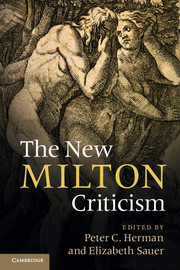Book contents
- Frontmatter
- Contents
- Notes on contributors
- Acknowledgments
- Note on editions
- Introduction Paradigms lost, paradigms found: the New Milton Criticism
- Part I Theodicies
- Part II Critical receptions
- Chapter 7 Against fescues and ferulas: personal affront and the path to individual liberty in Milton’s early prose
- Chapter 8 Disruptive partners: Milton and seventeenth-century women writers
- Chapter 9 Eve and the ironic theodicy of the New Milton Criticism
- Chapter 10 Man and thinker: Denis Saurat, and the old new Milton criticism
- Chapter 11 The poverty of context: Cambridge School History and the New Milton Criticism
- Chapter 12 Afterword
- Index
- References
Chapter 9 - Eve and the ironic theodicy of the New Milton Criticism
Published online by Cambridge University Press: 05 June 2012
- Frontmatter
- Contents
- Notes on contributors
- Acknowledgments
- Note on editions
- Introduction Paradigms lost, paradigms found: the New Milton Criticism
- Part I Theodicies
- Part II Critical receptions
- Chapter 7 Against fescues and ferulas: personal affront and the path to individual liberty in Milton’s early prose
- Chapter 8 Disruptive partners: Milton and seventeenth-century women writers
- Chapter 9 Eve and the ironic theodicy of the New Milton Criticism
- Chapter 10 Man and thinker: Denis Saurat, and the old new Milton criticism
- Chapter 11 The poverty of context: Cambridge School History and the New Milton Criticism
- Chapter 12 Afterword
- Index
- References
Summary
By attending to the history of reception, new Milton critics may find supports but also challenges for their own intuitions and experiences. This has been one of the founding concepts of recent revisionist criticism, and for my purposes in this essay, it is best illustrated by the thesis and findings of Joseph A. Wittreich’s Feminist Milton. As Wittreich shows, early women readers, in particular of the last quarter of the eighteenth century and the pre-Victorian nineteenth century, read Milton as a source of liberation, and mined proof-texts from his works, especially Paradise Lost, in order to counter the patriarchal tradition of biblical misogyny, all the while crediting Milton with the exposure of an unjust moral code of repression that many of his eighteenth-century male readers and editors, most notably Thomas Newton, attributed to the poet himself. “Newton aimed,” as Marcus Walsh says, “to justify the poetic ways of Milton to eighteenth-century men.” Thus these male editors and readers produced the orthodox and masculinist Milton of tradition, which has ironically become the figure reproduced by some feminist reactions against Milton from the 1970s on. Although the epic’s representation of sexuality is, in my reading, marked by contradiction, I share the view, eloquently expressed by James Grantham Turner, that Milton’s “poem sees when he is seen least wise.” This essay joins with Wittreich to provide a minority report on the reception of Milton’s epic, with an eye toward the prospect such a report opens on critical practice today, its limitations and perhaps unrealized possibilities.
By its nature, the study of reception argues for the enduring importance of history, in its full particularity, as a component of interpretation – not just as an engine that sets the consensus in motion, but also as an enabling vehicle for future work that dissents from majority positions. How else to approach the crises and cruxes of interpretation but by, in Areopagitica’s terms, trying all things? To speak of a consensus of opinion when discussing Milton criticism is perilously to beg the question of exemplarity: to what extent is one view of Milton’s Eve more extraordinary or more common than another? It is doubtless true that reception history has a way of unearthing preconditions of interpretation that lie at the very foundations of the readings built at specific moments.
- Type
- Chapter
- Information
- The New Milton Criticism , pp. 175 - 193Publisher: Cambridge University PressPrint publication year: 2012
References
- 2
- Cited by



